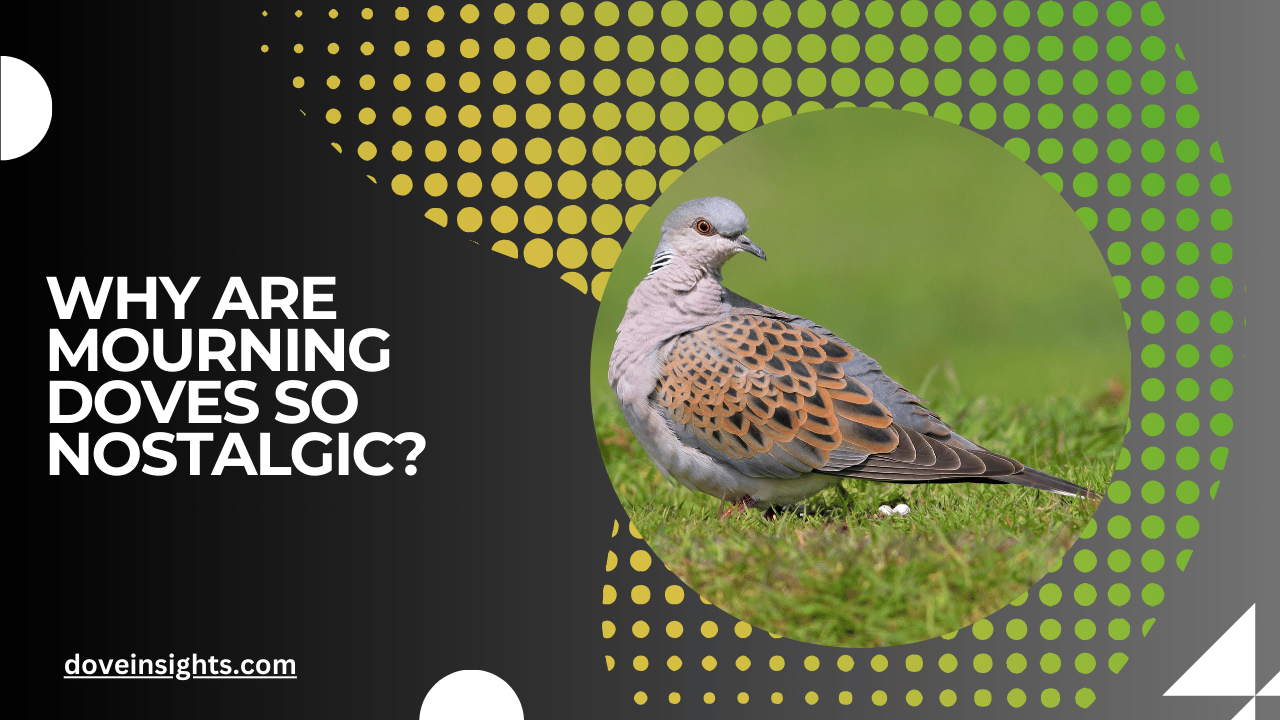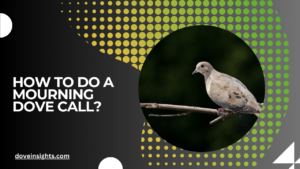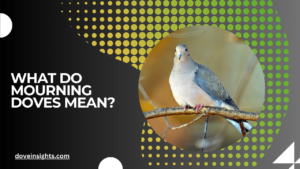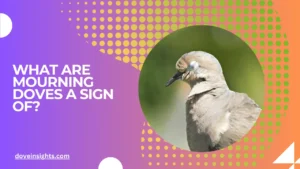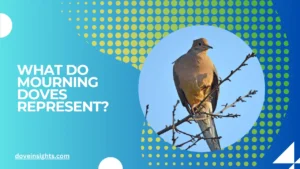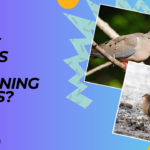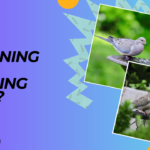There’s a certain melancholy beauty in the sound of a mourning dove’s call.
Its soft, mournful coo seems to echo through the stillness of the air, invoking feelings of longing, yearning, and yes, nostalgia. But what is it about these birds that stirs such deep emotions in us?
Why do mourning doves seem to carry a sense of nostalgia, as if their presence alone connects us to something distant, something lost?
The concept of nostalgia is often associated with longing for the past or a time that once was. In the case of mourning doves, their symbolic connection to grief, loss, and healing plays a pivotal role in making them appear nostalgic.
Their song—haunting and peaceful—reminds us of fleeting moments, unspoken memories, and the delicate nature of time.
This article explores why mourning doves evoke such powerful feelings of nostalgia, and how their behaviors, symbolism, and place in culture make them unique messengers of the past.
Understanding why mourning doves feel so nostalgic is not just about their sound, but also about their role in nature and human experience. It’s about how these birds intertwine with the rhythm of life, representing the passing of time and the healing of emotional wounds.
By exploring their symbolism, habits, and cultural significance, we can uncover the mystery behind the nostalgia they inspire and how they affect us on a deeper emotional level.
Contents
- 1 The Haunting Sound of the Mourning Dove
- 2 The Symbolism of Mourning Doves in Culture
- 3 The Mourning Dove’s Role in Nature and the Passage of Time
- 4 Mourning Doves and Their Association with Grief and Healing
- 5 Personal Experiences and the Emotional Impact of Mourning Doves
- 6 Conclusion:
- 7 FAQ’s
- 7.0.1 Why do mourning doves evoke feelings of nostalgia?
- 7.0.2 What does the call of a mourning dove mean?
- 7.0.3 Do mourning doves symbolize anything in different cultures?
- 7.0.4 How do mourning doves relate to grief and healing?
- 7.0.5 Why do mourning doves seem nostalgic?
- 7.0.6 Can hearing a mourning dove’s call trigger personal memories?
The Haunting Sound of the Mourning Dove
One of the primary reasons mourning doves evoke nostalgia is their distinctive call—a sound that seems to carry a sense of longing and sorrow.
Their call is often described as soft and mournful, resembling a sighing melody. This haunting sound is not just a vocalization; it’s a symbol of grief, loss, and emotional reflection.
The mourning dove’s song has the power to transport listeners to a time of remembrance or introspection, often triggering memories of loved ones, past experiences, and emotions tied to loss.
The cooing sound is symbolic of mourning—a term that naturally connects to the process of grief. But what makes it nostalgic is the universality of its meaning. The song can trigger feelings of sadness, but it also brings about healing and a sense of comfort.
It reminds us that life is transient, and that we must cherish the memories of the past while remaining hopeful for the future. This emotional depth that the dove’s call carries is what connects it to a universal experience of nostalgia.
This deep connection to emotion through sound is why so many cultures associate mourning doves with spirituality, healing, and comfort.
The sound is not just a reminder of sadness, but also of the peace that can follow grief, which makes it inherently nostalgic.
The Symbolism of Mourning Doves in Culture
In many cultures, the mourning dove holds deep symbolic meaning tied to loss, healing, and transition. Their presence often represents the departure of something significant—whether it be a loved one, a chapter of life, or a specific period in time.
This connection to transitions is why mourning doves feel nostalgic.
They symbolize that delicate space between grief and renewal, evoking a sense of longing for the past while signaling hope for the future.
In Christian symbolism, for example, mourning doves are often seen as messengers of the Holy Spirit and are linked to the themes of peace and heavenly comfort.
Their symbolic role in various religious contexts further strengthens the nostalgic association, as they often represent the soul’s journey and reconnection with loved ones who have passed.
The mourning dove’s role in folklore is similarly tied to themes of remembrance and reflection. Across cultures, the bird’s soft song is heard during moments of quiet contemplation, often signaling a time to reflect on memories of the past.
Whether it is the symbol of lost love, a spiritual messenger, or simply a reminder of seasons gone by, the mourning dove remains a powerful symbol of the passage of time, making it impossible to separate it from feelings of nostalgia.
The Mourning Dove’s Role in Nature and the Passage of Time
Mourning doves are also significant because of their role in the natural world. They are often the first signs of spring, their cooing marking the beginning of warmer months.
This natural cycle ties mourning doves to the passage of time, which in turn connects them to the idea of nostalgia. The cyclical nature of the seasons is inherently tied to the passage of time and reminds us of moments that have come and gone.
The way mourning doves migrate also highlights the theme of transition. Every fall, mourning doves fly south, leaving behind the places they called home during the summer months. This migration is a poignant reminder of change and the impermanence of life, reinforcing the idea that nothing stays the same forever.
It’s easy to feel nostalgic when we see them return year after year, as they symbolize the continuity of life despite its inevitable changes.
In this sense, mourning doves remind us of the natural rhythms of life—birth, growth, change, and eventual rest.
The simplicity and elegance of their presence in the world serve as a quiet testament to the beauty of life’s natural flow, making them a symbol of time passing and the memories we hold dear.
Mourning Doves and Their Association with Grief and Healing
The mourning dove’s association with grief and healing is another layer to their nostalgic significance. As their name suggests, mourning doves are often associated with the mourning process, specifically the emotional journey that follows loss.
In times of grief, hearing the soft cooing of a mourning dove can evoke a sense of comfort and closure, as if the bird itself is offering a message of peace and healing.
In psychological terms, nostalgia is often triggered by emotional experiences, especially those related to loss or longing.
Mourning doves, with their soft, tender song, connect us to those emotions in a way that feels comforting yet reflective. They remind us that even in the aftermath of grief, there is hope for healing and renewal.
This delicate balance between sorrow and peace is what makes mourning doves so inherently nostalgic.
Moreover, the connection between mourning doves and healing is not just about emotional recovery but also about the passage of time.
Over time, we often learn to cherish the memories of loved ones lost, and the mourning dove serves as a gentle reminder that while grief may never fully disappear, it can eventually be replaced by peace and reflection.
This makes the mourning dove a symbol of the healing process and of the emotional wisdom that comes with time.
Personal Experiences and the Emotional Impact of Mourning Doves
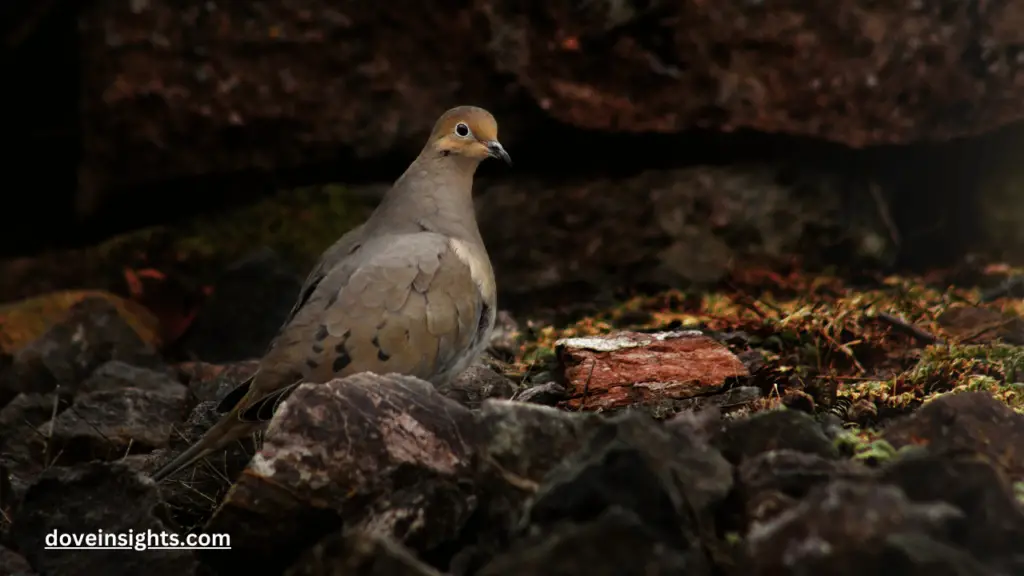
For many people, the presence of mourning doves brings a sense of peaceful nostalgia. Personal experiences with these birds can create a deep emotional connection that transcends their symbolic meaning.
Whether it’s hearing their song in a quiet moment of solitude or seeing them gather in a beloved garden, mourning doves often become intertwined with personal memories and experiences.
The nostalgia that mourning doves inspire is personal and subjective. For some, they may remind us of childhood summers, peaceful moments spent in nature, or loved ones who have passed.
For others, their presence might be a symbol of the comfort and solace found in nature’s consistency. In either case, mourning doves serve as a bridge between our own past and present, reminding us of the fleeting beauty of life.
This emotional connection is what makes mourning doves so special. They offer not just a connection to the natural world, but also to personal memories and shared experiences, making them a universal symbol of nostalgia.
Conclusion:
In the end, mourning doves are far more than just birds in the sky.
Their melancholic song, symbolism of grief, and presence in our lives make them powerful messengers of nostalgia. Whether it’s their role in the natural world or their deep connection to human emotions, mourning doves remind us of the fleeting nature of life, the inevitability of change, and the beauty found in reflection.
By understanding why mourning doves are so nostalgic, we gain insight into not only their role in nature but also their significance in our own lives. They carry within them the echoes of past experiences, the wisdom of healing, and the quiet promise that, even after the most difficult moments, there is peace to be found.
In the end, mourning doves help us appreciate the memories that shape us, while gently urging us forward, offering us hope and comfort as we navigate the passage of time.
FAQ’s
Why do mourning doves evoke feelings of nostalgia?
Mourning doves’ soft, mournful call and their symbolism of grief and healing evoke feelings of longing for the past and memories of loved ones lost. Their song is associated with emotional reflection, making them a natural trigger for nostalgia.
What does the call of a mourning dove mean?
The call of a mourning dove is often described as a mournful, haunting sound that represents grief, yearning, and longing. It connects to the themes of loss and healing, evoking deep emotional responses.
Do mourning doves symbolize anything in different cultures?
Yes, mourning doves are symbols of peace, transition, and spiritual messages in many cultures. They are often associated with healing and the passing of time.
How do mourning doves relate to grief and healing?
Mourning doves are linked to the emotional journey of grief, often providing a sense of comfort and peace. Their presence during moments of sorrow symbolizes the healing process and the eventual return of calm after loss.
Why do mourning doves seem nostalgic?
Mourning doves represent the passage of time and the cycle of life, symbolizing change, healing, and reflection. Their cooing reminds us of the fleeting nature of time and the memories we hold dear.
Can hearing a mourning dove’s call trigger personal memories?
Yes, for many people, the call of a mourning dove is deeply personal, evoking memories of childhood, lost loved ones, or past experiences. It often stirs feelings of reflection and nostalgia.

